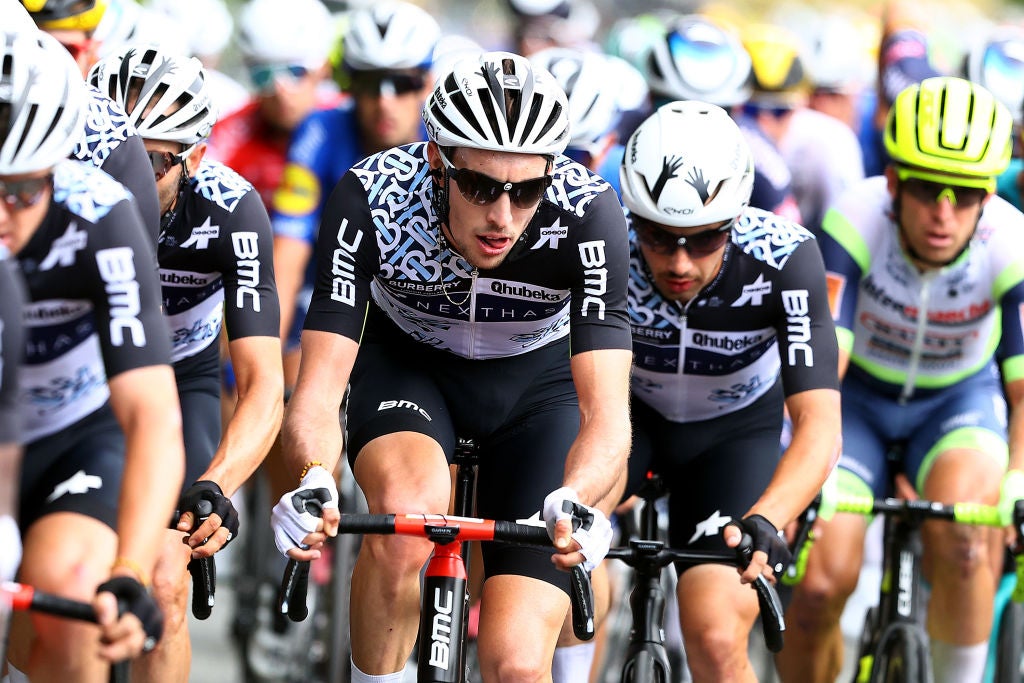Tour de France unsung heroes: Michael Gogl on swapping the cello for bike racing

Michael Gogl is riding his fourth Tour de France (Photo: Michael Steele/Getty Images)
Throughout the Tour de France, VeloNews will be talking to some of the unsung heroes in the peloton – those riders that battle on each day without the recognition the major GC favorites or sprint stars receive.
Michael Gogl could have been a cellist, well maybe not quite.
Gogl, who rides for Qhubeka-NextHash, used to bang out a tune on the stringed instrument as a child but he left it behind when he found his talents were better suited to sport.
These days, playing the cello is a nice but distant memory for the Austrian, and an activity he’s happy to let the professionals do.
Also read: Tour de France unsung heroes: Jonas Rickaert – school prankster, lead-out man to the stars
“I was playing cello when I was young, but I have to say that my music talent was never really there. I’m more listening to music and my brother is playing the violin professionally, but I don’t play anymore,” Gogl told VeloNews.
“My mom was always trying to teach us the music side of life and my dad was always pushing for the sport side of life. One son stuck to the music side and the other one to the sport side,” he said.
Gogl usually listens to more modern music these days, but he hasn’t left classical music behind completely and he likes to watch his brother perform when he gets the chance to.
Also read: Tour de France unsung heroes: Jacopo Guarnieri balancing single parenthood with racing
“Every now and then, I visit my brother, who is in the orchestra, and I really like to listen to what they are doing,” Gogl said. “It’s something different and I think young people don’t really like it or get to understand the music. But when you’re there, and you feel it and the power of the orchestra, that’s mind-blowing sometimes.”
Instead of having a jam session on the cello when he’s not racing, Gogl likes to get outside. Often, like many riders, he likes to go out running but sometimes he likes to ease up and follow his girlfriend’s more sedate pastime.
“I just love to be out in nature and my girlfriend has a really nice hobby. She’s watching birds,” said Gogl. “Sometimes I just go with her and she’s telling me which bird it is. And I’m like ‘ah yeah really’, without really having too much of a clue but it’s just relaxing.
Never again
Gogl is riding his fourth Tour de France this year, after making his debut back in 2017. This year’s race has been a tough one and he had to visit the race doctor for cramps during Wednesday’s brutal double ascent of Mont Ventoux.
His team Qhubeka-NextHash has lost Nic Dlamini and Victor Campenaerts following some tough days in the mountains.
However, little will compare with the pain and torture of his first Tour de France appearance. The Austrian was so determined to finish the race, despite a serious injury, that it took him months to recover from the effort.
Also read: Tour de France unsung heroes: Hugo Houle wants to win a stage in memory of his brother
“I broke my pelvis in my first Tour de France. I suffered through 10 stages and finished in Paris. This is the most memorable thing but also the thing would never do again,” Gogl told VeloNews with a wry laugh. “It was kind of weird because it was broken in a place where we didn’t really think it’s possible something is broken there. It was four days after the crash when we finally managed to go to the truck where we can make the pictures [x-rays].
Fortunately for the now 27-year-old, he was able to recover through rehab and he was back at the Tour de France the following year.
“I think most of the riders in the bike race like the Tour de France have a high pain acceptance. It was always the most painful in the first minutes of the day but when you got into it, you forgot about it, and it got better. But I had to ride a lot out of the saddle too. When I think back, it’s just like, ‘what did we do there?’,” Gogl said.
“I needed quite a long time afterward to recover. It was my maybe not the greatest move. It actually needed almost until December. I was trying to do some more races, which I couldn’t finish that year.
“I couldn’t turn like my leg over the pedal anymore after like 40 minutes of riding with 100 watts. Back then, as a neo-pro, I was really scared if that meant that my career will be in threat. In the end, I met some really wonderful people in the Innsbruck rehabilitation center, and they helped me out.”